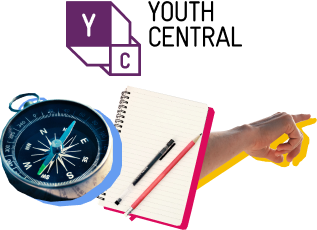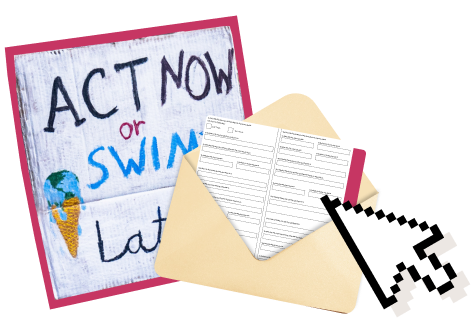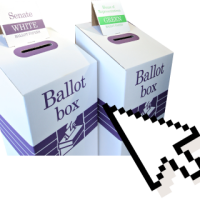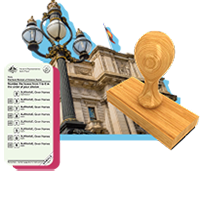
Advocacy is about standing up for what you believe is right and supporting change.
Advocacy can take many forms and span across any issue, big or small.
108
petitions were tabled in the Victorian Parliament in 2024
What does it mean to advocate?
To publicly support an individual, group, cause or policy.
When you advocate for your rights, you protect not only yourself but help to make sure other young people feel safe and respected.
YACVic’s YERP platform provides information about different types of advocacy and things to consider before you advocate for something.
Identify your advocacy goals
Advocating for an issue you care about can be hard. It's often helpful and less overwhelming to first assess the situation, identify your goals and create a plan!
Start by reflecting on why a cause is important to you and considering what may be needed to create positive change.
Seek support to advocate more effectively
Don’t go at it alone. Seek support by reaching out to a trusted person, an expert, or an organisation.
Advocating for your rights can be hard, but when you do, it empowers yourself, inspires other, and drives change.
Advocating for an issue you care about
There are a number of different ways to influence change through advocacy. Here are some of the most well-known.
Write a letter
Writing a letter to decision-makers or those with power to influence change can be an effective way to advocate for an issue you care about. Here are some helpful tips for writing a good letter:
- Explain the problem, and share your opinion about it.
- Ask for a specific action, or make a suggestion on how to solve an issue.
- If you have direct experience with the issue, you may like to include some details about your story.
- You may be able to strengthen your letter by including evidence of the problem, or why what you are asking for is a good idea (doing your research first might help).
- Use clear and respectful language.
For local issues you may wish to contact your Local Council or Member of Parliament. You could also reach out to the responsible State or Federal minister e.g. Minister for Environment for environmental issues.
You can find your Local Council or State Member of Parliament on the Victorian Electoral Commission website and the current list of State Ministers on the Parliament of Victoria website.
Your Federal Member of Parliament can be found on the Australian Electoral Commission website and the list of current Federal Ministers on the Prime Minister of Australia website.
Petitions
Petitions are written requests signed by many people which are submitted to decisions makers to demonstrate support for a particular cause or action. Petitions can help you show that many people care about a cause or want to see a change.
Find out more about starting or signing a petition to express your support for a cause at both state and federal levels.
Here are some helpful tips for starting your own petition:
- Be clear on what your cause is about - this will allow others to understand the petition and will encourage them to sign it as well.
- Promote your petition where people will see it: either in person, online, or both.
- Clearly mention what action you are wanting to advocate for with the petition.
- Use polite and respectful language to get people on your side.
Protests
Historically protests have played a powerful role in gaining community support on important issues and influencing change.
In Victoria, Section 16 of the Charter of Human Rights and Responsibilities Act protects the rights of peaceful assembly and freedom association. An example is to gather for a common purpose, such as participating in a peaceful protest.
Some peaceful protests are carefully managed by organisers to support the safety of participants, and those who may be impacted. However, some protests can become dangerous. If you’re planning to participate in a protest, you can take steps to make sure you and others stay safe:
- If you’re not sure what to expect, contact the organisers to get more information. This could include to make sure you understand the cause and planned safety precautions.
- Do some research to understand your rights, and make sure you understand and follow laws.
- If you are under 18 years old, talk to a trusted adult before participating in a protest. They may be able to provide guidance to support your safety, and might accompany you to the event.
- Ensure your behaviour remains peaceful and respectful.
Whether you are participating in a protest in-person or online, ensure your behaviour remains peaceful and respectful. Find out more about navigating online spaces (link to ‘Navigating online spaces’).
By understanding our rights, and the avenues that can help support our rights, we can effectively advocate for ourselves and others.
It's important we stand together and support one another in our shared journey to create a fairer, more inclusive community where everyone feels valued, respected and safe!
How can I get involved in advocacy?
You can advocate on any issue big or small and there are plenty of ways to start your advocacy journey. These are some good places to start:
- Youth Affairs Council Victoria (YACVicc) is the peak body for young people and the youth sector in Victoria. They offer various programs, resources, and opportunities for young people to get involved in advocacy and make a difference in their communities.
- Youth Disability Advocacy Service (YDAS) is an advocacy organisation dedicated to supporting disabled young people to speak up on what matters to them and achieve their human rights.
- Victorian Youth Congress (VYC) is an advisory group of young people aged 12 - 25 who work with the Victorian Government to identify and advocate for issues that matter to young people.
- YMCA Youth Parliament program provides young people aged 16-25 with a unique opportunity to learn about the parliamentary process, develop leadership skills, and advocate for issues they are passionate about.
- Australian Youth Affairs Coalition (AYAC)is the national peak body for young people and the youth sector in Australia offering resources, advocacy opportunities, and a platform for youth voices.
- Minus18 is focused on improving the lives of LGBTQIA+ young people through youth empowerment programs, events, education and partnerships.
- Centre for Multicultural Youth (CMY) is dedicated to ensuring multicultural young people, including from asylum seeker and refugee communities, are connected, empowered and influential. Their youth participation and leadership programs allow young people to connect with others, learn and develop skills, have their voices heard, and create positive change in their lives and communities.
- Koorie Youth Council (KYC) is a state-wide organisation that facilitates and amplifies the voices, aspirations and experiences of all Aboriginal and Torres Strait Islander young people residing in Victoria.
When you speak up and encourage others to realise the injustices around them, they're also encouraged to speak up. It's incredibly powerful!
Looking after yourself
If something has happened which is impacting your wellbeing, it’s a good idea to talk to a trusted adult. You can also reach out to these services:
- For crisis support, call Lifeline: 13 11 14 or visit the Lifeline website (24/7).
- For counselling support, call KidsHelpline: 1800 55 1800.
- For support chatting to someone online, on the phone or in-person visit Headspace.
- For counselling support, visit Beyond Blue.
- For support from a peer worker, visit ReachOut.
For Aboriginal and Torres Strait Islander people:
- Call Yarning SafeNStrong on 1800 959 563 or visit the Yarning SafeNStrong website.
- Call 13 Yarn (13 92 76) or visit the 13 Yarn website.
For LGBTIQA+ people:
- Call Rainbow Door on 1800 729 367, text 0480 017 246 (10am-5pm/7 days) or email the Rainbow Door support@rainbowdoor.org.au.
- Visit the LGBTIQA+ switchboard at www.switchboard.org.au.
If you have a disability, you may be able to find a support tailored for your needs by calling the Disability Gateway 1800 643 787
Remember:
- Advocacy is publicly supporting an individual, group, cause or policy
- To advocate you should first identify your goals and seek out support
- Advocating for an issue can involve writing a letter, a petition or organising a protest
- There are plenty of avenues to get involved in advocacy.

Ready to put your skills into practice?
Get comprehensive guidance on voting and elections at Youth Central.







